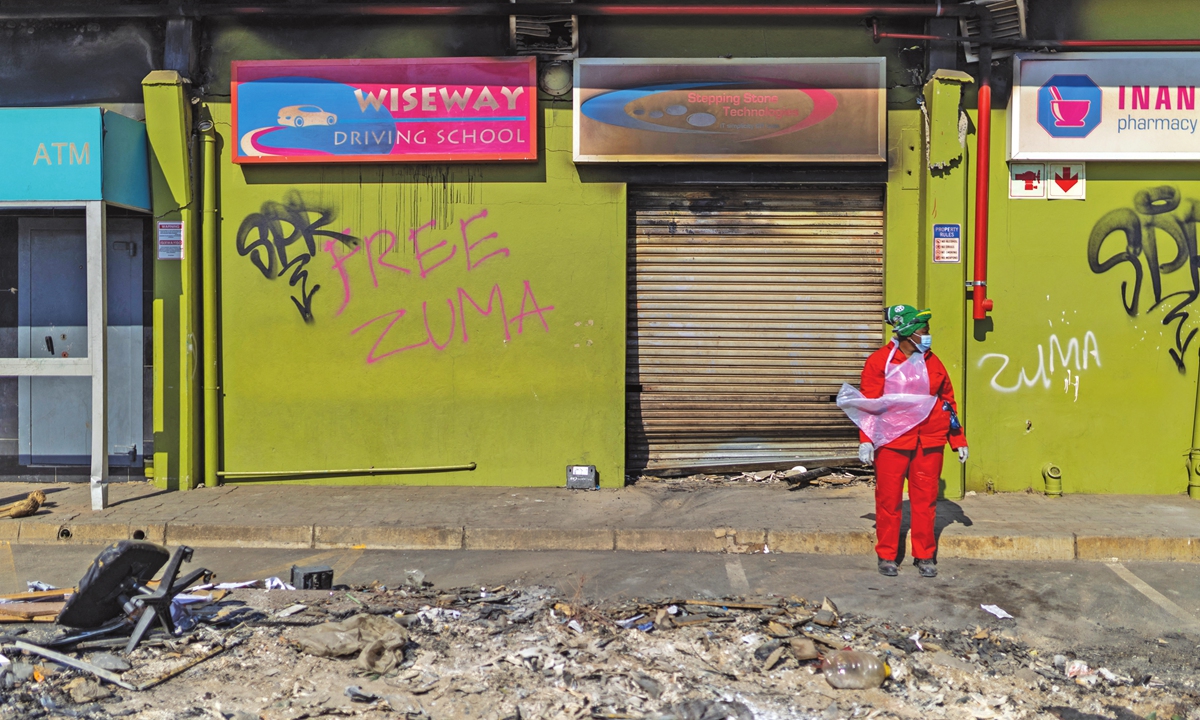Social Controversy – Global Times
A woman can be seen next to a “Free Zuma” graffiti during a cleaning campaign in Dube Village Mall in Durban on Saturday. Photo: AFP
South Africans on Saturday cleaned up malls and stores that were looted, claimed more than 200 lives and caused more than $ 1 billion in damage during a week of violence that rocked the country.
Aid organizations also distributed food to communities that were cut off from major roads or grocery stores looted during the riots.
The violence – the worst in South Africa after apartheid – broke out after former President Jacob Zuma was sentenced to 15 months in prison for rejecting a corruption investigation.
His successor President Cyril Ramaphosa, who pledged to curb the transplant, said the riot was a “coordinated and well-planned attack” on the country’s fledgling democracy.
“Under the pretext of a political complaint, the people behind these acts tried to provoke a popular uprising,” said Ramaphosa in a televised address on Friday.
The riots caused widespread destruction – estimated at Rand 16 billion ($ 1.1 billion) – and left thousands of businesses, including many retail stores, that were specifically targeted.
When an uneasy calm set in on Saturday, residents of the hard-hit KwaZulu-Natal province swept up rubble in various places, including the Dube Village Mall in the municipality of Inanda north of Durban.
Behind them, walls had been sprayed with spikes and barbed wire with the words “Free Zuma”.
Zuma, whose home province is KwaZulu-Natal, enjoys the support of the loyalists in the ruling African National Congress, who portray him as an advocate for the poor.
As violence escalated after Zuma surrendered to authorities last week, Ramaphosa reached out to the nation on Sunday to help defuse simmering tensions.
Just minutes later, recalls Sikhumukani Hongwane, who worked one shift as a private security guard at the mall, a crowd set fire to a nearby garage and he fled.
Entering a charred shop, he describes the trauma of many: “We’re scared, even now. All the memories … come back. We can’t sleep.”
Many in the province are now starving after grocery stores were looted and burned or vendors cut off due to road closures.
The government, charities and religious groups distributed food to those in need, including hospital patients and families.
“We are loading bread for the staff of five hospitals,” said Imtiaz Sooliman, director of Gift of the Givers.
Sooliman said his food convoys were being escorted by armed security forces. AFP journalists saw a supermarket delivery vehicle escorted by the police.
“Yesterday we sent food for patients to private hospitals – they had no food to feed patients. They have all the money but they can’t buy anything. They called us and said the patients hadn’t eaten,” he said .
The organization also delivered door-to-door food packages after a government minister told him on Friday that dozens of Durban areas had no access to food, Sooliman added.
The few shops that were spared are only open a few hours a day, and in some places the price of bread has almost doubled.
“It’s chaos because the few businesses here can’t take the whole community. The few businesses we have [have] Standing in line as if people were voting, “said Siyanda Nxumalo, a community activist in Inanda.
“Poorly prepared”
The traffic on the main motorway, which connected the north with the port city of Durban, which had been closed for days, returned to normal.
But the companies in Durban want more security: “As far as we have cleared the hurdle, we are still afraid,” said Zanele Khomo from the Durban Chamber of Commerce and Industry to AFP.
Ramaphosa said the instigators had “tried to take advantage of the social and economic conditions many South Africans live in – conditions that have worsened since the COVID-19 outbreak”.
It will take “a few months” for business to get back to normal, he said.
Of the 212 people reported killed, some were shot and others died in looting attacks.
On Thursday, the government announced that one of the alleged perpetrators had been arrested and eleven were being monitored. There has been no update since then.
Ramaphosa admitted the government was “poorly prepared for an orchestrated campaign of public violence”.
Opposition politicians have condemned the handling of the crisis.
On the eve of Nelson Mandela’s birthday, the country’s first black leader, his widow Graca Machel, said she could not “sit quietly while the country of his birth is at war with itself”.
“We must be brave enough to question and resolve the underlying causes of our discord,” she said in a statement before July 18, International Mandela Day.
AFP

